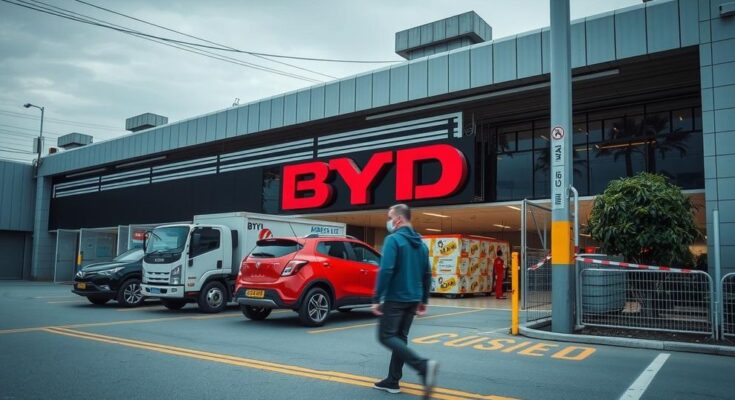Brazil has closed a BYD factory site in Camaçari due to reports of severe labor conditions, including workers living in inhumane conditions and experiencing forced labor. The factory was supposed to be BYD’s first EV site outside of Asia, with operations expected to commence in March 2025. This incident prompted BYD to relocate affected workers to hotels while emphasizing their efforts to improve conditions in collaboration with the construction firm.
Brazil has recently halted operations at a BYD factory located in Camaçari, citing inhumane working and living conditions as the reason. This facility was set to become BYD’s first electric vehicle (EV) plant outside of Asia, with operations expected to begin in March 2025. Workers employed by Jinjiang Construction Brazil reported distressing living conditions, including sleeping on mattress-less beds and sharing bathrooms among 31 individuals, as revealed by prosecutors.
The Brazilian Public Ministry of Labor (MPT) described the employees’ conditions as indicative of “slavery-like” scenarios defined under Brazilian law. Such situations include debt bondage and any work that undermines human dignity. Furthermore, the MPT highlighted that many workers experienced “forced labor,” facing withheld wages and excessive penalties for quitting their jobs. In response to these allegations, BYD has relocated the affected workers to hotel accommodations and stated that it had made multiple requests for improvements in the workers’ living conditions from the construction firm employed.
BYD, renowned as one of the largest electric vehicle manufacturers globally, surpassed Tesla in electric vehicle sales in the last quarter of 2023. The company has also been diversifying its presence in Brazil, a significant market for the company. Following its initial establishment of a factory in São Paulo in 2015, BYD announced a substantial investment of 3 billion reais ($484.2 million) last year to further develop its manufacturing capacity in Brazil. Despite the demand for EVs driven by government incentives in China, international markets, including the United States and the European Union, have been increasingly critical of preferential support extended to Chinese automakers.
The article discusses concerns surrounding labor conditions at a BYD factory in Brazil, which was anticipated to be BYD’s first overseas EV manufacturing facility. The factory’s construction took place amid broader discussions about labor rights and human dignity in the context of foreign investment in emerging markets. Moreover, the situation unfolded against the backdrop of a competitive landscape in the global electric vehicle market, where BYD is striving to solidify its position amidst scrutiny and regulatory challenges in major markets due to perceived advantages given to Chinese manufacturers by their government.
In conclusion, the closure of the BYD factory site highlights significant labor rights issues related to working conditions in Brazil. The allegations of inhumane treatment and forced labor illuminate the critical importance of ensuring fair labor practices in global supply chains, particularly for companies expanding their operations internationally. Upholding human rights not only reflects ethical business practices but also plays a crucial role in maintaining a company’s reputation in a highly competitive and increasingly scrutinised global market.
Original Source: www.bbc.com




